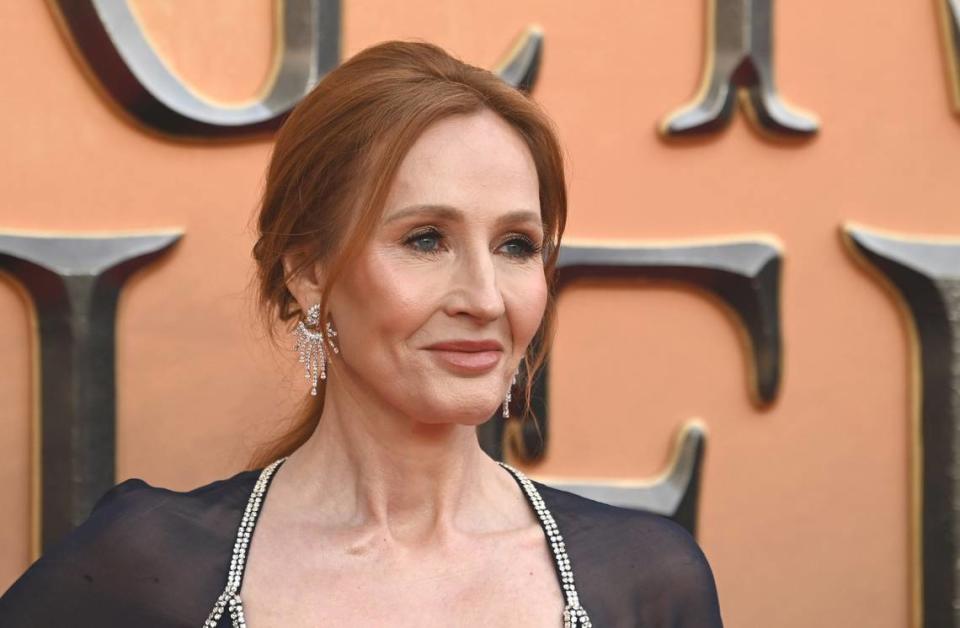The mob came for a Harry Potter game because Rowling speaks out on gender. That’s crazy | Opinion
- Oops!Something went wrong.Please try again later.
“Hogwarts Legacy,” a Harry Potter-inspired video game, boasted a massive release Friday, despite calls from some players to boycott the game because it’s part of author J.K. Rowling’s franchise and the author has been vocal about traditional views on sex, gender fluidity and fiercely protective of single-sex spaces in the public sphere.
The ongoing attempt to cancel her does not bode well for free speech and is a spine-tingling example of an Orwellian society. And yet, despite the controversy around Rowling’s name, the game had one of the largest single-day releases for a PC game, according to SteamDB.
These large numbers could bode well for Rowling’s franchise and even mean that some gamer audiences are ambivalent about Rowling’s traditional views on gender, so long as the Hogwarts Legacy game is compelling. But the controversy and calls for boycott surrounding the game and author do not bode well for what’s to come in the United Kingdom and even here in America.

IGN, a site that covers gaming, gave “Hogwarts Legacy” a 9 out of 10, but its review includes a 200-word section headlined “Concerning J.K. Rowling.” Here, the outlet felt compelled to explain why it even reviewed the game, given the controversy, and added that the reviewers “don’t necessarily share her views.”
Jessie Earl, a YouTuber who is transgender, tweeted that supporting the game is “harmful to trans people.” Rowling directly responded and suggested, in a tweet dripping with sarcasm, that such a statement was reminiscent to book burning.
Deeply disappointed @jessiegender doesn't realise purethink is incompatible with owning ANYTHING connected with me, in ANY form. The truly righteous wouldn't just burn their books and movies but the local library, anything with an owl on it and their own pet dogs. #DoBetter 1/2 pic.twitter.com/LqANqab8Km
— J.K. Rowling (@jk_rowling) December 17, 2022
One can hardly blame Rowling for being so sardonic. She didn’t create the game but because it reflects her beloved Harry Potter franchise, somehow it harms transgender people because the creator of its inspiration believes transgender women cannot be women. Anyone follow?
Controversy involving Rowling and gender fluidity began in 2018 and has escalated since. In 2019 she defended Maya Forstater, a London-based woman who lost her job because of similar beliefs. In 2020, she began mocking language that tried to demonstrate an appeal to inclusivity, “ ‘People who menstruate.’ I’m sure there used to be a word for those people,” Rowling tweeted. “Someone help me out. Wumben? Wimpund? Woomud?”
She published an essay of more than 3,600 words on her website about why she has spoken out on such issues, revealing that her history as a survivor of domestic abuse informs her sympathy for women and belief in the need for single-sex spaces.
As Scotland barreled toward codifying gender fluidity into law, Rowling became more vocal. She condemned a “Gender Recognition Reform” bill, legislation in Scotland that would make it easier for a trans person to legally change gender. It would have allowed those 16 and older to make the change as soon as they were expressing a different gender. The Scottish Parliament approved the measure, but it was blocked in the U.K. last month.
The response to Rowling’s common sense and plea for women and their safety and privacy has been appalling: From sexist slurs and death threats to the actors from “Harry Potter” movies disavowing her and her work — the entire, beautiful, magical world she created. There’s even a book binder in Canada who will strip any Rowling books of her name and re-bind them without it, a slap in the face to a writer.
The attempt to disenfranchise J.K. Rowling for holding firm to and expressing traditional beliefs has been purposeful and does not bode well for the future of such expression. The mob simply can’t handle it.
Stripping Rowling of her art — or any art even associated with her franchise — simply because she has been an outspoken opponent of the concept of gender fluidity, specifically where it erases women’s privacy and safety rights, is truly Orwellian. Censoring or smearing Rowling and her ideas over beliefs that have been held for millennia is a bad sign for the future of free speech.

